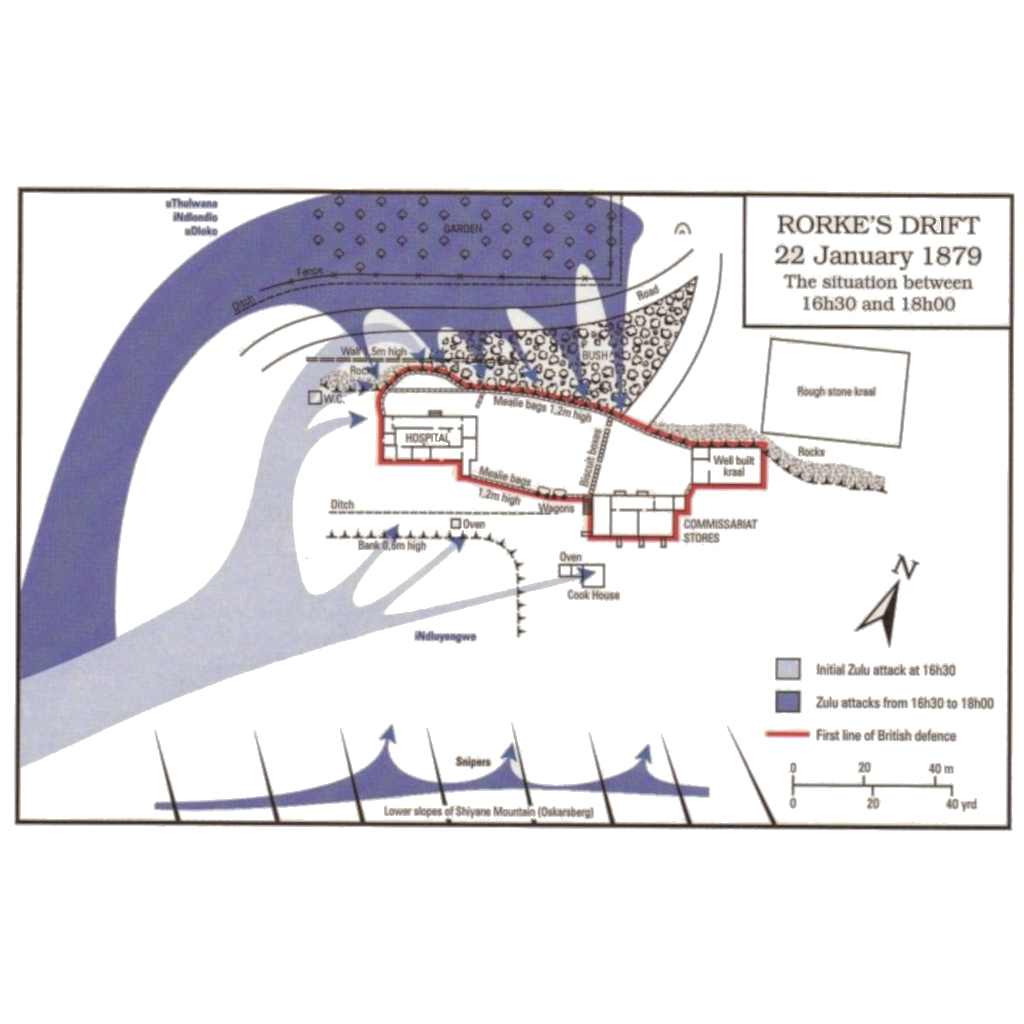The Battle of Rorke’s Drift took place on 22nd to 23rd January 1879, during the Anglo-Zulu War. It was a significant engagement following the British defeat at the Battle of Isandlwana earlier that day. The battle occurred at the Rorke’s Drift mission station, a small British outpost on the border of the British colony of Natal and the Zulu Kingdom.
The British garrison at Rorke’s Drift consisted of just over 150 men, including sick and wounded soldiers, under the command of Lieutenants John Chard of the Royal Engineers and Gonville Bromhead of the 24th Regiment of Foot. They faced an attack by 3,000 to 4,000 Zulu warriors led by Prince Dabulamanzi kaMpande.
The Zulu forces launched a series of massive but piecemeal attacks on the British position. Despite being heavily outnumbered, the British defenders managed to hold their ground by constructing makeshift barricades and fortifying the buildings with loopholes for firing. The defenders repelled wave after wave of Zulu attacks throughout the night, enduring intense hand-to-hand combat.
The battle lasted for approximately 12 hours, during which the British forces sustained 17 killed and 15 wounded, while the Zulu casualties were estimated to be around 351 killed and about 500 wounded. The successful defence of Rorke’s Drift was a remarkable feat, and eleven Victoria Crosses were awarded to individual defenders for their bravery.
The Battle of Rorke’s Drift became a symbol of British resilience and determination, boosting morale and public support for the war effort back home. It also highlighted the fierce resistance of the Zulu warriors and the complexities of colonial conflicts in Southern Africa.
Orders of Battle
British Orders of Battle
- British Commander-in-chief
- No. 3 Column (detachment) Lt J.RM. Chard RE
- B Company 2/24th (2nd Warwickshire) Regiment of Foot, Lt G. Bromhead
- 2nd/3rd East Kent (The Buffs) Regiment of Foot
- 1/24th (2nd Warwickshire) Regiment of Foot
- 90th (Perthshire Volunteers Light Infantry) Regiment of Foot
- Royal Artillery
- Royal Engineers
- Commissariat Department
- Army Medical Department
- Chaplain’s Department
- Natal native Police
- Natal Native Contingent
- Ferryman
Zulu Orders of Battle
- Zulu Commander-in-chief
- Prince Dabulamanzi kaMapande
- uThulwana
- uDloko
- inDluyengwe
- inDlondlo
Download This Scenario
How it Played
Sources
Other blog categories that may be of interest. 10mm ACW Project, 10mm AWI Project, 10mm AZW Project, 10mm CGW Project, 10mm FIW Project, 10mm Sci-Fi Projects, Aliens, Dropzone Commander, Terra Nova, 10mm WWI Project, 10mm WWII Project, 10mm Zombie Project, Battle Reports & Scenarios, Making Scenery & Terrain, Painting Guides, Shows & Events, Solo Wargaming, Wargaming Projects, Wargaming Rules.


Leave a Reply